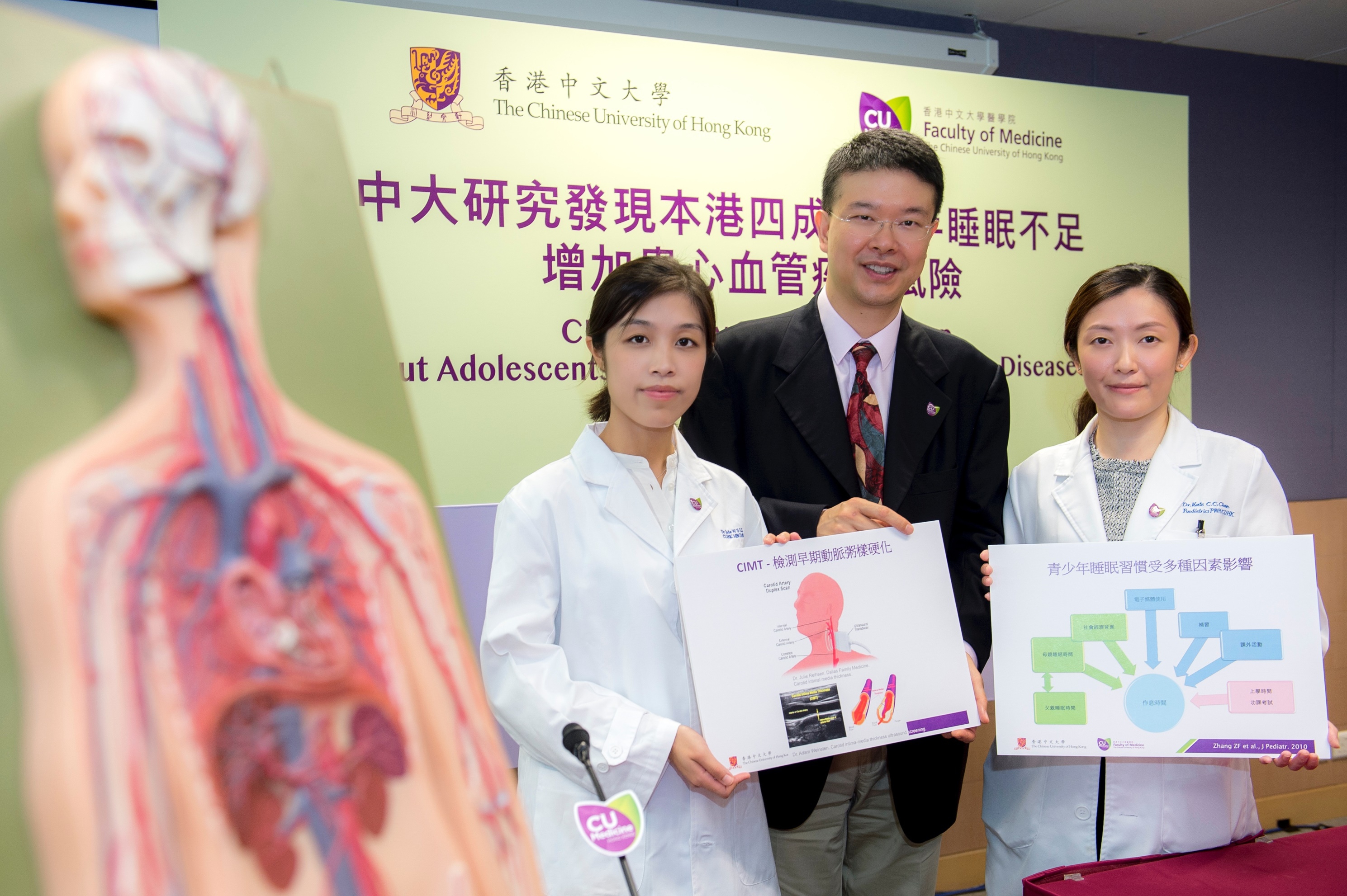CUHK
News Centre
CUHK Study Sees Shorter Sleep Put Adolescents at Risk of Future Cardiovascular Diseases
Researchers of the Faculty of Medicine at The Chinese University of Hong Kong (CUHK) have recently conducted a study which revealed that shorter sleep duration puts adolescents at risk of cardiovascular diseases. The research team measured the Carotid Intima-Media Thickness (CIMT) of 142 adolescents and recorded their mean sleep duration. Results showed that almost 40% of participating adolescents did not get at least 8 hours of sleep as recommended by the National Sleep Foundation. It was also seen that shorter sleep duration is associated with increased CIMT, which implies higher risk of cardiovascular diseases in the future. The study results have been published in The Journal of Pediatrics.
Sleep is crucial in promoting cardiovascular health
The National Sleep Foundation has published recommendations on optimal sleep duration for those aged 17 or below, which is at least 8 hours per day. But most of the adolescents sleep less than the recommended amount. In a CUHK study published in 2015, more than half of 4,500 participating local school adolescents rated themselves as having insufficient sleep and “weekend compensation” has become the norm. This is also a common sleep pattern in Asian culture.
Sleep is an essential physiological process in humans. It plays an important role in maintaining metabolic homeostasis, ensuring memory consolidation and body restoration. Several epidemiologic studies in adults suggested a link between short sleep duration and an increased risk of developing cardiovascular diseases, including coronary artery disease, congestive heart failure and hypertension. However, whether insufficient sleep in adolescents would predispose them to future cardiovascular adverse events remained unclear.
CIMT as surrogate marker to assess for cardiovascular diseases risk in adolescents
Researchers from the Faculty of Medicine at CUHK recruited 142 adolescents aged between 10 and 17 years old who were not overweight and had no history of suffering from obstructive apnoea (OSA) in 2012 to 2015. Participants were asked to complete a prospective 7-day sleep diary and undergo external ultrasound carotid scans for the measurement of their CIMT, i.e. the thickness of the innermost two layers of the wall of an artery.
Dr. Jade Wing Sum LI, fresh medical graduate of CUHK, explained, “Cardiovascular diseases are rarely found among adolescents, so there is no conventional method for assessing their related risk. CIMT has been validated for predicting cardiovascular risk in adults. It is user-friendly, no radiation is involved and it can detect early atherosclerosis, so we use CIMT as a safe and reliable surrogate marker to predict the participants’ future cardiovascular risks.”
40% of adolescents sleep less than 8 hours
Participating adolescents were divided into different groups by mean sleep duration according to the 7-day sleep diary. Almost 40% of the participants did not get at least 8 hours of sleep as recommended by the National Sleep Foundation.
The study results also demonstrated that shorter sleep duration is associated with increased CIMT. Details are tabulated as follows:
|
|
Mean sleep duration over the past 7 days |
||
|
≤ 7 hrs |
7.01 to 8 hrs |
> 10 hrs |
|
|
CIMT (mm) |
0.49 |
0.47 |
0.44 |
Shorter sleep duration resulting in higher risk of adverse cardiovascular events
Professor Albert Martin LI, Department of Paediatrics of the Faculty of Medicine at CUHK, said, “Our study results demonstrate that sleep deprivation is associated with a greater CIMT in adolescents, independent of obesity and OSA. The mean CIMT in subjects sleeping less than or equal to 7 hours is also comparable to children with familial hypercholesterolemia which is 0.494 mm. Therefore, our subjects sleeping less than or equal to 7 hours are at equal risk of early adverse cardiovascular events as those with familial hypercholesterolemia.”
Professor LI added, “Previous paediatric studies have confirmed that CIMT is increased in the presence of cardiovascular disease risk factors such as hypertension, dyslipidemia and diabetes mellitus. Our group has also previously found that in non-obese adolescents, short sleep duration is associated with an increased blood pressure. As inadequate sleep is a common global phenomenon in modern society, we need to have prompt intervention to prevent the increase in future cardiovascular events.”
Delaying school start time may help improve adolescents’ sleep duration and health
In our locality, sleep pattern is influenced by multiple factors, including school start time, parental sleep/wake pattern and daytime activities such as electronic media use and homework. CUHK’s research team has documented that delaying school start time by a modest 15 minutes is able to improve the subjective feelings toward sleep quantity and quality among the students, with corresponding improvements in mood and behaviours.
Dr. Kate Ching Ching CHAN, Assistant Professor of the Department of Paediatrics of the Faculty of Medicine at CUHK, stated, “Our study demonstrates the importance of adequate sleep duration in adolescents, who are at higher risk from insufficient sleep and delayed circadian rhythm. Simple measures such as delaying school start time to increase sleep duration may be the way forward in tackling adulthood cardiovascular morbidity and mortality.”
Researchers of the Faculty of Medicine at CUHK have recently conducted a study which revealed that shorter sleep duration puts adolescents at risk of cardiovascular diseases. (From left) Dr. Jade LI, fresh medical graduate of CUHK; Professor Albert LI and Dr. Kate CHAN, both from the Department of Paediatrics of the Faculty of Medicine at CUHK.
Professor Albert LI states that inadequate sleep is a common global phenomenon in modern society, prompt intervention is needed to prevent the increase in future cardiovascular events.
Dr. Jade LI (left) says that shorter sleep duration is associated with increased Carotid Intima-Media Thickness (CIMT), which implies higher risk of cardiovascular diseases in the future.











